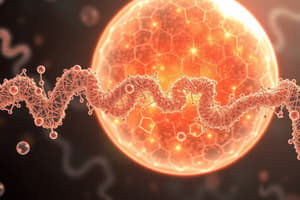Podcast
Questions and Answers
What is the function of the enzyme phenylalanine hydroxylase in the human body?
What is the function of the enzyme phenylalanine hydroxylase in the human body?
- Converts tyrosine into neurotransmitters
- Converts phenylalanine into tyrosine (correct)
- Produces phenylalanine in the liver
- Breaks down proteins into amino acids
What is the result of the accumulation of phenylalanine to toxic levels in the blood and brain?
What is the result of the accumulation of phenylalanine to toxic levels in the blood and brain?
- Development of Maternal PKU Syndrome
- Severe brain disorders and intellectual disability (correct)
- Elevation of tyrosine levels in the blood
- Production of neurotransmitters
Why is it necessary for pregnant women with PKU to monitor their phenylalanine levels?
Why is it necessary for pregnant women with PKU to monitor their phenylalanine levels?
- To increase the production of neurotransmitters
- To reduce the risk of heart defects in the baby (correct)
- To increase the production of tyrosine
- To reduce the risk of seizures
What is the location of the phenylalanine hydroxylase gene?
What is the location of the phenylalanine hydroxylase gene?
What is the relationship between phenylalanine and tyrosine in the brain?
What is the relationship between phenylalanine and tyrosine in the brain?
What is the primary mechanism by which elevated Phe levels affect dopamine and serotonin synthesis?
What is the primary mechanism by which elevated Phe levels affect dopamine and serotonin synthesis?
What is the primary purpose of measuring blood tyrosine levels in PKU screening?
What is the primary purpose of measuring blood tyrosine levels in PKU screening?
What is the primary goal of the low Phe diet in PKU treatment?
What is the primary goal of the low Phe diet in PKU treatment?
What is the typical timing of PKU screening in newborns?
What is the typical timing of PKU screening in newborns?
What is the purpose of customized Phe intake in PKU patients?
What is the purpose of customized Phe intake in PKU patients?
Flashcards are hidden until you start studying
Study Notes
Phenylketonuria (PKU)
- A rare metabolic disease that can lead to severe brain disorders due to the accumulation of the amino acid phenylalanine (Phe) to toxic levels in the blood and brain.
- Caused by the deficiency of the enzyme phenylalanine hydroxylase, which converts Phe to tyrosine.
Amino Acids and Phenylalanine
- Amino acids are the basic building blocks of proteins.
- Phenylalanine (Phe) is an essential amino acid, necessary for life, but cannot be produced by the human body.
- Phe must be acquired through foods that contain protein.
Normal Metabolism of Phenylalanine
- Normally, Phe is converted to tyrosine by the enzyme phenylalanine hydroxylase.
- Tyrosine is then converted into neurotransmitters essential for normal brain development and function.
Genetic Disorder
- PKU is an autosomal recessive genetic disorder that affects the function of the phenylalanine hydroxylase enzyme.
- The phenylalanine hydroxylase gene is located on chromosome 12, with over 600 mutations described.
Symptoms of PKU
- Untreated, people with PKU develop symptoms such as severe intellectual disability, psychiatric disorders, and seizures.
Maternal PKU Syndrome
- A pregnant woman with PKU must pay special attention to her Phe levels to reduce the risk of Maternal PKU Syndrome.
- Maternal PKU Syndrome can result in heart defects, microcephaly, and developmental disability in the baby.
Effect of Elevated Phe Levels on Brain Function
- Elevated Phe levels and reduced tyrosine levels can change the way the brain functions.
- Phe occupies the same transporters as tyrosine and tryptophan, reducing their levels in the brain.
- This leads to decreased levels of dopamine, norepinephrine, and serotonin, resulting in abnormal brain development and intellectual disability.
Diagnosis and Treatment
- Testing for PKU is typically done as part of routine newborn screening approximately 24 hours after birth.
- First-line therapy for PKU is the low Phe diet, which includes medical foods and modified foods to restrict Phe intake.
- Patients must customize their Phe dietary intake with medical professionals according to their individual needs.
Studying That Suits You
Use AI to generate personalized quizzes and flashcards to suit your learning preferences.




